 Petzlover
Petzlover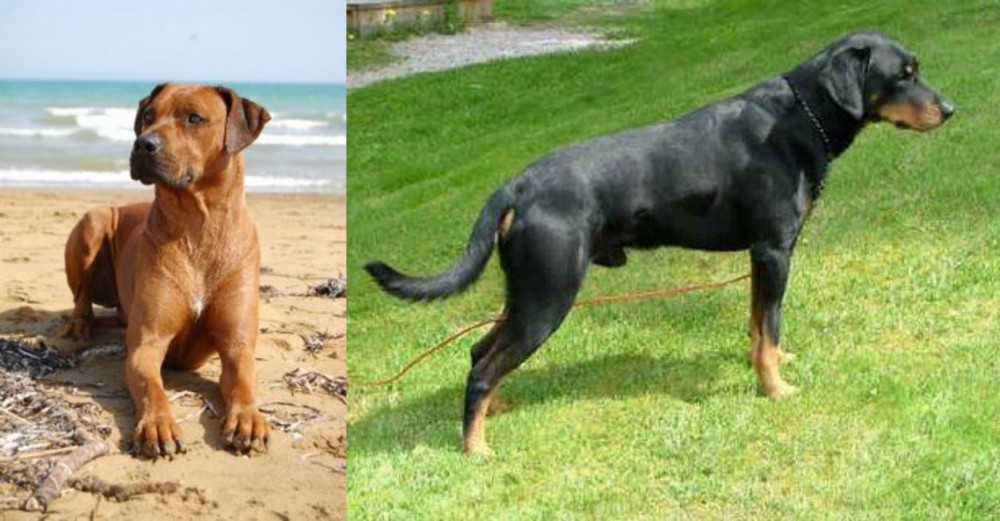 Rhodesian Ridgeback is originated from Zimbabwe but Smalandsstovare is originated from Sweden. Rhodesian Ridgeback may grow 15 cm / 6 inches higher than Smalandsstovare. Rhodesian Ridgeback may weigh 23 kg / 51 pounds more than Smalandsstovare. Both Rhodesian Ridgeback and Smalandsstovare has same life span. Both Rhodesian Ridgeback and Smalandsstovare has almost same litter size. Both Rhodesian Ridgeback and Smalandsstovare requires Low Maintenance.
Rhodesian Ridgeback is originated from Zimbabwe but Smalandsstovare is originated from Sweden. Rhodesian Ridgeback may grow 15 cm / 6 inches higher than Smalandsstovare. Rhodesian Ridgeback may weigh 23 kg / 51 pounds more than Smalandsstovare. Both Rhodesian Ridgeback and Smalandsstovare has same life span. Both Rhodesian Ridgeback and Smalandsstovare has almost same litter size. Both Rhodesian Ridgeback and Smalandsstovare requires Low Maintenance.
 Known as the African Lion Dog, the courageous Rhodesian Ridgeback hails from Rhodesia, now Zimbabwe.
Known as the African Lion Dog, the courageous Rhodesian Ridgeback hails from Rhodesia, now Zimbabwe.
He was bred essentially to be a hunter as well as a home guardian. These dogs were crossed with European dogs, with the original breed standard being drafted by F.R. Barnes By the 1860s, European colonisers had imported certain European dog breeds to the area such as Greyhound, Terriers, Bloodhounds as well as other breeds. These were mixed with the indigenous African dogs.
The Ridgeback Club was also founded. It was in 1955 that the American Kennel Club recognized the dog as a member of the Hound group.
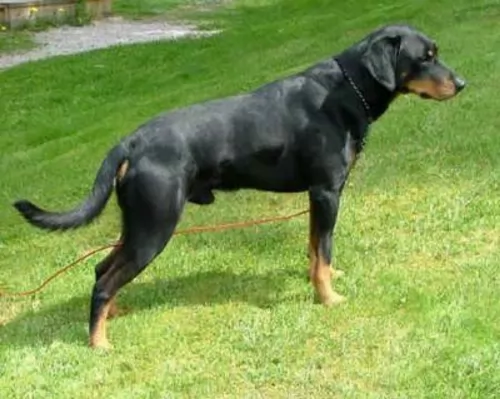 The Smålandsstövare has got quite a long history and dates back to the 1600s. He is the smallest of the Swedish hound breeds. This is a scenthound.
The Smålandsstövare has got quite a long history and dates back to the 1600s. He is the smallest of the Swedish hound breeds. This is a scenthound.
Hounds similar to the Smålandsstövare were bred with European hounds and then brought to Småland and bred with local spitz-type farm dogs to create the foundation stock for the Smålandsstövare.
The dog was used to hunt but nearly died out in the 20th century, but breeders restored it and the first official standard emerged by the Swedish Kennel Club in 1921.
The Smålandsstövare is a rare dog breed but it is recognized by the American Rare Breed Association as well as other major kennel clubs, one of which is the Federation Cynologique Internationale as well as the United Kennel Club.
 Perhaps the most noticeable thing with this large, handsome formidable looking dog is the ridge of hair that runs along his back and gives him his name. The rest of the coat is short and smooth and can be a reddish tan color or wheaten shade.
Perhaps the most noticeable thing with this large, handsome formidable looking dog is the ridge of hair that runs along his back and gives him his name. The rest of the coat is short and smooth and can be a reddish tan color or wheaten shade.
He is a slender, athletic dog with an alert, intelligent face. The ears of the dog are floppy and carried close to the head, being broad and then narrowing to a rounded ear. The tail is long,broad at the base and tapers. He is a large dog that stands at between 61 and 69cm and weighs between 29 and 41kg.
In spite of his athletic build, he isn’t an overly active dog like many other breeds but will require a walk ever day as well as ball- and rope games.
He is a quiet, gentle dog, strong and confident, while also being strong willed and independent. He is tolerant around children, but isn’t the kind of dog that relishes being around little kids who try to climb over him.
He is smart and can be easily trained. Training and socialization turn him into an awesome pet.
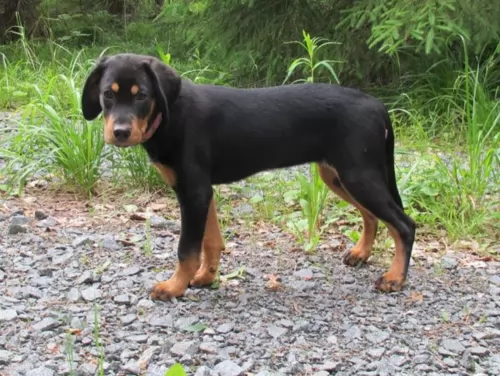 The Smålandsstövare is a muscled, compact looking dog. The double coat is shortish to medium length and is thick and quite coarse to the touch. He sheds seasonally. The coat is usually black with tan markings.
The Smålandsstövare is a muscled, compact looking dog. The double coat is shortish to medium length and is thick and quite coarse to the touch. He sheds seasonally. The coat is usually black with tan markings.
The high set ears are medium length and floppy, the head is slim and the tail can be naturally short. Sometimes the tail is long and can be slightly curved in the spitz-like sabre fashion.
The eyes are brown and friendly. The height of these dogs is about 46 to 54cm and he weighs anything from 15 to 18kg.
Usually a well behaved, quiet, calm, gentle dog, the Smålandsstövare takes his role as guard dog seriously, wanting to protect his family.
His good temperament ensures he gets on well with all members of the family. He is full of energy and will need to be exercised well, whether it be ball games in the garden, a walk around the block, a run in the park or joining his family on hikes and camping trips.
It is why he won’t settle down well on a small property in the city. He needs larger premises to expend his energy, and if in cramped premises without exercise, he may resort to barking and whining and this may well drive your neighbors bats.
Training and socializing your Smålandsstövare will be necessary and it should be easy as he is intelligent.
 Your Ridgeback is a dignified dog who is devoted to his human family, being aloof around strangers.
Your Ridgeback is a dignified dog who is devoted to his human family, being aloof around strangers.
He is a territorial dog and takes his job as guard dog seriously. He is confident and independent, and with his good looks, his loyalty and devotion, he is guaranteed to make you a most splendid pet and companion.
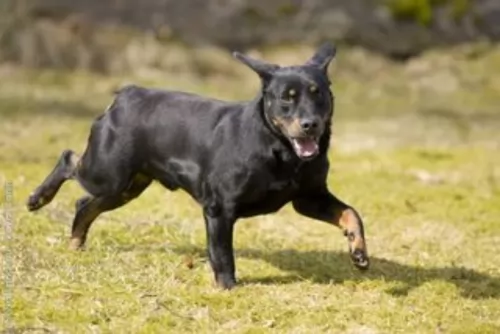 The Smålandsstövare is a robust dog with a lot of stamina. He will be wanting a lot of exercise and is ideal as a pet in the suburbs or the countryside but not ideal for city living.
The Smålandsstövare is a robust dog with a lot of stamina. He will be wanting a lot of exercise and is ideal as a pet in the suburbs or the countryside but not ideal for city living.
He makes a wonderful family pet, forming strong bonds with his owners. He makes an excellent watchdog too wanting to protect his family, and with this amicable, calm dog, you’re going to have a true friend.
 Rhodesian Ridgebacks are generally healthy, robust dogs, but like with all breeds, they can also have their share of some of the common dog illnesses there are.
Rhodesian Ridgebacks are generally healthy, robust dogs, but like with all breeds, they can also have their share of some of the common dog illnesses there are.
If you’re buying a puppy, make sure it comes from a good breeder.
This is a hereditary disease which can become worse because of environmental factors such as rapid growth. The thighbone doesn’t fit properly into the hip joint.
It is sad when you see such a strong dog succumbing to hip dysplasia as it can cause a lot of pain and also make your dog lame. Arthritis can also occur.
For such a life threatening illness with a dog, it is wise to familiarize yourself with an emergency vet in your area. A dog with bloat needs to be rushed to the vet as soon as possible.
That is why it is better to feed your pet smaller meals daily rather than one big meal. Bloat is an ailment where there is rapid accumulation of gas in the stomach.
Dogs with deep chests are at a greater risk of bloat. Typical symptoms of bloat include restlessness, a swollen, hard stomach and trying to vomit.
Canine bloat or gastric dilatation and volvulus is a killer with dogs, with the gas accumulation causing the stomach to twist.
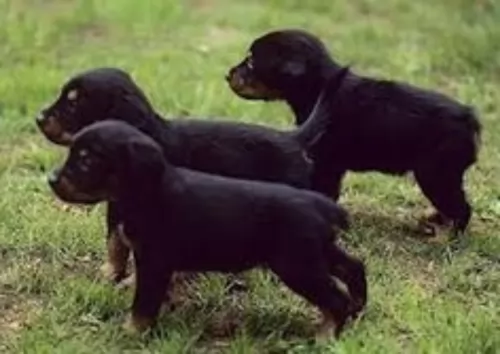 The Smålandsstövare is a rare dog breed and not much is known about congenital conditions to which he may be particularly prone.
The Smålandsstövare is a rare dog breed and not much is known about congenital conditions to which he may be particularly prone.
With good care he can reach 14 or 15 years of age. The floppy ears put him at risk for ear infections, while other conditions to watch for include hip dysplasia, cancer, bloat and obesity.
If you see your dog shaking his head or pawing at his ears, look inside because the ears may be red and inflamed. It is important to get help quickly for ear problems in dogs.
Ear canals are sensitive so if you don’t want to clean the ear and work on it yourself it is important to get your pet to the vet. The vet will clean your dog’s ears and also prescribe antibiotics.
For future treatment, you will need to clean your dog’s ears and keep them dry. If you don’t want to do this yourself, make sure to get him to professional groomers who will do this for you.
 The Rhodesian Ridgeback only sheds a little so you can keep him looking good with a brush twice a week.The shiny coat can be maintained by wiping him down with a damp cloth. Look out for any unusual lumps you might find.
The Rhodesian Ridgeback only sheds a little so you can keep him looking good with a brush twice a week.The shiny coat can be maintained by wiping him down with a damp cloth. Look out for any unusual lumps you might find.
He has floppy ears so during your grooming session check inside his ears and make sure they aren’t red. You can suspect an ear infection when you see your Ridgeback shaking his head or scratching his ears.
Check inside your Ridgeback’s mouth too as dogs can’t tell you when they’ve got a rotten tooth that is causing terrible pain and also poisoning their entire system.
Trim his nails too if they don’t wear down naturally.
Your large Rhodesian Ridgeback will need good food from you if you want to have less visits to the vet because of illness.
If you have a puppy feed him 4 bowls of food a day, but once your dog is one year of age he can have two bowls of food. Two bowls are better than one as with one bowl, your dog becomes ravenous and gobble his food down. This can lead to bloat.
It is always convenient to feed him one of the top quality commercially manufactured dog foods but he will also need some tasty home-made food too. Boiled chicken, brown rice or pasta and spinach, sweet potatoes and carrots are a healthy choice for your pet – plain and simple dog food, just like dogs want.
They don’t want exotic, spicy foods that humans eat as it upsets their stomach. Chop this home-made food up ad put it into his dry kibble twice a week for a treat. Also try to give him a bit of raw meat occasionally. Never leave him without a constant source of fresh, cool water.
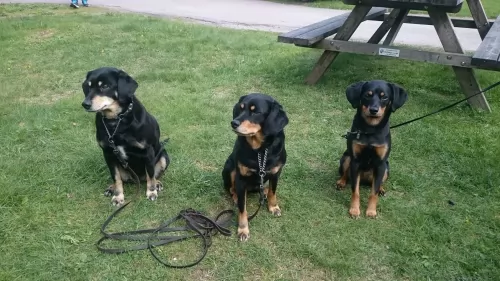 Choosing a good diet is imperative for the Smålandsstövare. Choose a commercially manufactured dog food high in vitamins and minerals.
Choosing a good diet is imperative for the Smålandsstövare. Choose a commercially manufactured dog food high in vitamins and minerals.
Give your dog a treat by providing him with some home-made food. It can be added into the dry kibble about twice a week as a treat. Boil brown rice and chicken in a pot and add in sweet potatoes, carrots and spinach. Chop all this up and give it to your dog in small portions. Also try to include some raw meat into the diet.
The Smålandsstövare is a very energetic breed and he is going to require some vigorous exercise every day. Take him for walks, allow him to run with you when you cycle or jog or take him swimming.